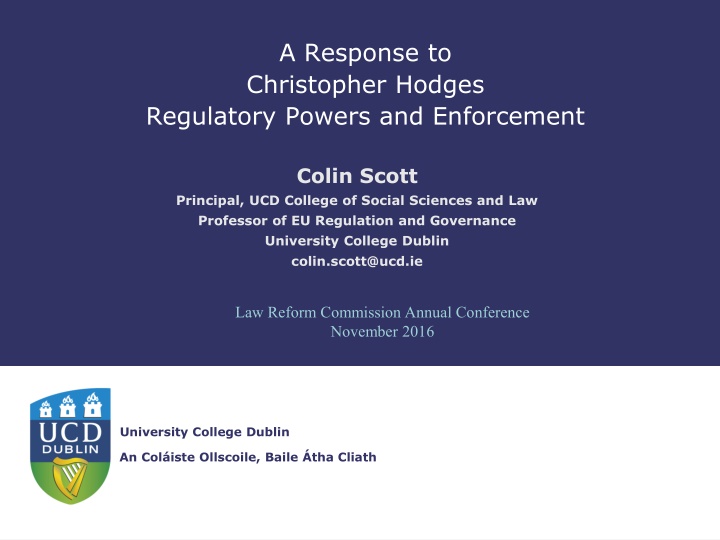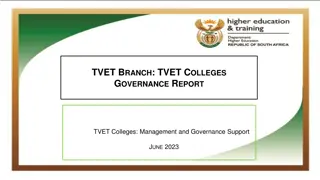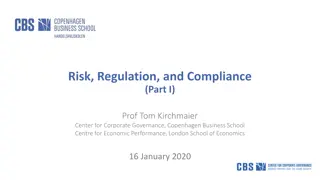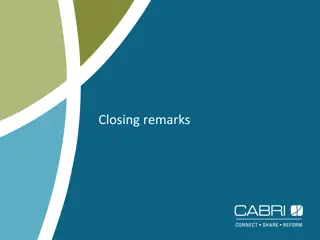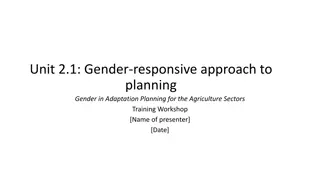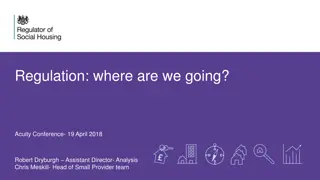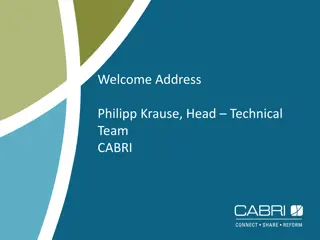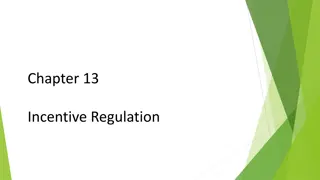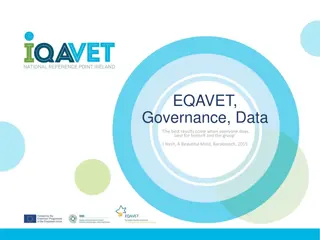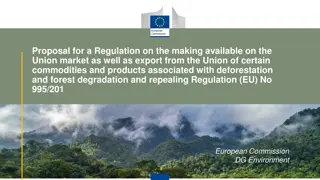Responsive Regulation and Collaborative Governance Insights
This content discusses the challenges and promises of regulation, emphasizing the importance of collaborative governance and skilled regulators. It touches on different regulatory mechanisms, conceptualizations of regulation, and responsive regulatory approaches. The need for oversight, engagement with various actors, and a flexible toolkit for effective implementation is highlighted to address regulatory challenges and promote compliance within diverse regulatory regimes.
Download Presentation

Please find below an Image/Link to download the presentation.
The content on the website is provided AS IS for your information and personal use only. It may not be sold, licensed, or shared on other websites without obtaining consent from the author.If you encounter any issues during the download, it is possible that the publisher has removed the file from their server.
You are allowed to download the files provided on this website for personal or commercial use, subject to the condition that they are used lawfully. All files are the property of their respective owners.
The content on the website is provided AS IS for your information and personal use only. It may not be sold, licensed, or shared on other websites without obtaining consent from the author.
E N D
Presentation Transcript
A Response to Christopher Hodges Regulatory Powers and Enforcement Colin Scott Principal, UCD College of Social Sciences and Law Professor of EU Regulation and Governance University College Dublin colin.scott@ucd.ie Law Reform Commission Annual Conference November 2016 University College Dublin An Col iste Ollscoile, Baile tha Cliath
Response 1. Agree that regulation is tricky because it is about changing behaviours. 2. Agree also that collaborative governance is promising search for capacity and engage key actors with the social, market and legal pressures which promote compliance. 3. However, collaborative modes require highly skilled regulators, paying attention to all dimensions of a regulatory regime, including availability of higher level penalties. 4. Effective mplementation is technically and culturally challenging and requires learning and iteration. 5. Where collaborative modes are not well overseen/implemented, businesses have opportunities for shirking see Honohan Report on Financial Crisis 2010. 6. Argues for more flexible toolkit, but also highly skilled regulatory cadre and recognition of wider range of actors in regulatory regimes. 7. Law reform by itself insufficient. Requires oversight of regulatory management and practice and new forms of engagement with firms.
Blacks Conceptualisation regulation is the sustained and focused attempt to alter the behaviour of others according to defined standards or purposes with the intention of producing a broadly identified outcome or outcomes which may involve mechanisms of standard-setting, information-gathering and behaviour-modification. (p20)
Regulation Self-Report Inspection Certification Audit Complaints Whistleblowing Bounties Rules/Principles Primary/Secondary Legislation Hard/Soft Law Associational/Bilateral Contracts Technical Standards Norms (standard- setting) Feedback (information gathering) License Revocation Criminal Sanctions Admin Penalties Warnings Advice Education Taxes Private Rights Scoreboards Media Correction (behaviour modification)
B Responsive Regulation Really Responsive Risk Based Regulation Nudges Meta-Regulation A Contract Eg private standards regimes, monitored, enforced through contracts, (individuated and collective (associations)) Gatekeepers, eg insurance, banking, immigration Social/market pressures C D eg Boycotts Buycotts Social Licence to operate Self- Regulation eg CSR employment contracts A Target of Regulation Firm, Govt Agency, NGO, Individuals B Government (agency and/or department) C Contracting Party (firm or government), Association (trade, sporting, etc) D Third parties eg consumers, NGOs, investors, competitors, employees
Enforcement Network Network Actions 1. Setting norms a. Legislation b. Compliance 2. Monitoring a. b. Programmes Agency oversight Sharing Information/ Experience Whistleblowing and complaints Enforcement a. Warnings b. Contract withdrawal c. Civil Proceedings d. Administrative Sanctions e. Agency Prosecution f. Cross-Sanctioning Agency Department National Agencies Overseas/Networks c. 3. European Commission Agency Enforcement Bodies: Garda S och na DPP Businesses Courts Consumers, Consumer Groups Professional Service Providers, Accountants, Lawyers NGOs, Trade Unions Media
